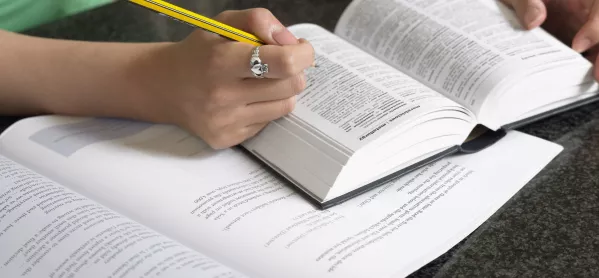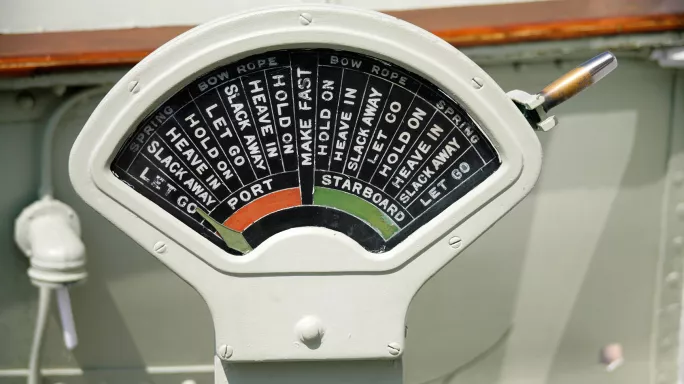Linguistic and literary terminology dominates our secondary English classrooms these days.
I became truly exasperated by this development when my students started talking about Shakespeare’s use of nouns.
One student proudly, but meaninglessly, focused on identifying Macbeth’s use of “dagger” as a concrete noun, when we were supposed to be discussing the spectacle of a character in the powerful grip of delusion.
Quick read: Seven ways to create an English curriculum for all
Quick listen: GCSEs: what has been the impact of the shift to linear exams?
Want to know more? George Orwell would be left speechless by education jargon
Something was out of kilter.
The terminology takeover has been a gradual creep over the past decade.
As a successful student of literature at A-level and degree, I had never heard of, let alone used, many of the terms that are common parlance today.
I did not comment on the use of anaphora, failed to explore the effects of stichomythia and never batted an eyelid at the use of noun phrases.
As a teacher, however, I have been guilty of promoting all kinds of terminology.
Students like knowing it. Students who have felt themselves to be no good at English have enjoy the power and esteem of knowing and using words that others don’t.
But this terminology can provide an illusion of achievement and progress. Noticing adjectival clauses can make students think that they are “doing” analysis when they are not.
The real complexity comes when we try to create a link between what we have spotted and the construction of meaning.
This is where our time needs to be spent, but it’s hard and it can be frustrating. Sometimes, terminology offers an easy win.
Exam anxiety
Some of the blame lies with the exam boards. In the anxious transition to the new specifications at GCSE and A-level, there was little to go on.
We were planning in the dark and one aspect we clung to was the indicative content in the exam board’s exemplar materials.
This was riddled with terminology in practically every band of achievement. With so much uncertainty, we stuck with teaching a skill that seemed certain.
And so a couple of years in, it feels a bit rich when examiners’ reports berate the focus on word-level’ close analysis coupled with inane identification of parts of speech or misplaced terminology.
So, where do we go from here? I have some suggestions for minimising misconceptions:
-
Terminology is form-specific. If we can get students to understand that the terminology tool-kit is specifically constructed to help us explore certain literary forms then we might be able to combat the misplaced discussion of Dickens’ use of caesura or Jane Eyre’s soliloquy.
-
Most of the time, students might spot alliteration but there is nothing meaningful to say about it….so tell them not to! I have witnessed more madcap attribution of meaning to the use of alliteration than any other technique.
-
Using two s-sounding words in the space of a couple of sentences is very unlikely to be Golding creating a snake sound in order to invoke the concept of original sin in Eden; equally, he is not “just making his writing flow”.
-
Impose an outright ban on: verisimilitude, noun-phrases, litotes, zeugma or any of the other more obscure classical rhetorical terms for anything but context-specific examples. I have seen all of the above more misused than needed.
Terminology can sometimes be useful. Students need the knowledge and power to recognise, understand and employ it, but only as an essential shorthand to their analytical point.
Terminology should perform the same function as the words we use from other languages: we order a cappuccino because it is more succinct than explaining the concept of an espresso with part hot milk and a cap of foam.
The word helps us to distinguish meaning more precisely and this is what terminology, well-used, must do.
Dr Kristina Jackets is a teacher and PGCE lecturer



